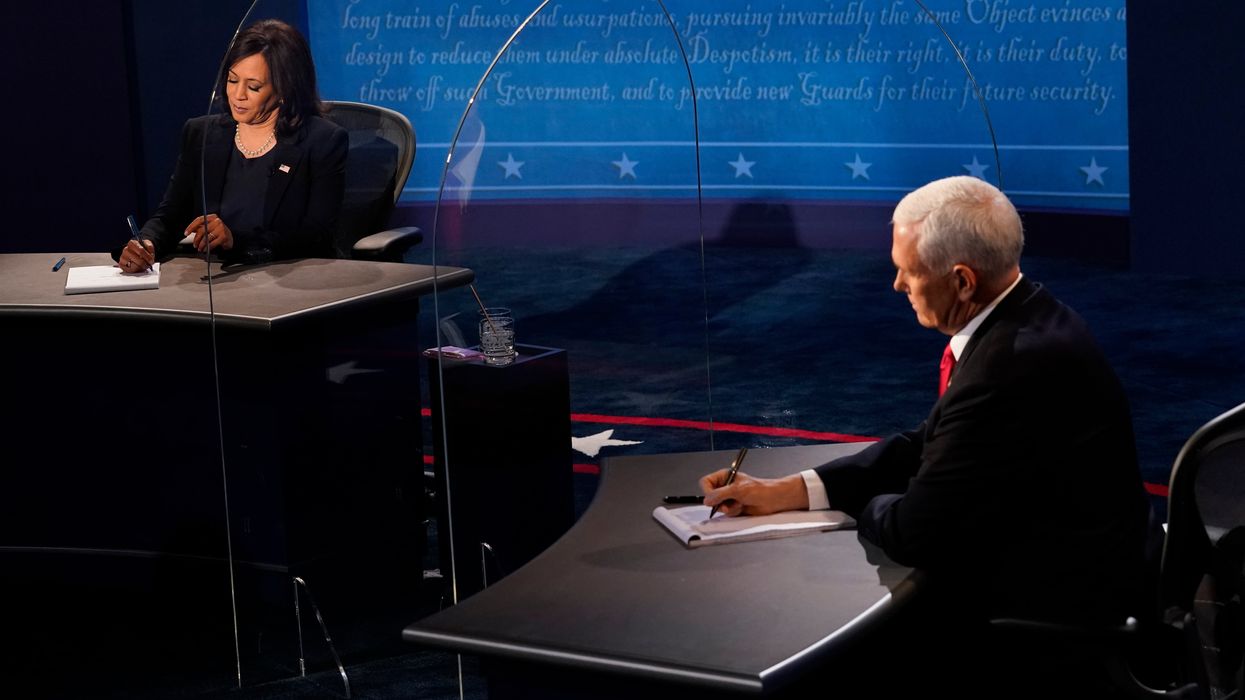Tobin founded the Free and Equal Elections Foundation and Beckerman founded Open the Debates. Both groups advocate for reducing the influence of the two major political parties. An earlier version of this piece was published by Independent Voter News.
Last week's presidential debate was an exhausting production that played into the divisiveness of our country, rather than focusing on solutions.
For a dozen years, we have been sounding the alarm on the control of these general election debates by the Republicans and Democrats, while creating alternative platforms that serve the people and improve our electoral system.
In March, we staged the first-ever cross-partisan presidential debate during the primaries. Eighteen candidates representing 10 political affiliations from across the political spectrum came together to demonstrate that real political debate is possible in this incredibly diverse nation. Grounded in respectful and constructive dialogue, these candidates articulated their competing ideas, values and visions for the United States.
On Thursday, at least five presidential contenders will join us in Denver for another open presidential debate. With the Commission on Presidential Debates reeling from its obviously poor stewardship of the process so far, Thursday's cross-partisan gathering will be an opportunity for the nation to advance a much more meaningful political discourse — one that represents our deep yearnings for a more perfect union.
While the commission claims to work "for the benefit of the American electorate" in arranging this year's three presidential and one vice presidential encounters, the only invited participants are the Republican ticket, President Trump and Vice President Mike Pence, and the Democratic ticket, former Vice President Joe Biden and Sen. Kamala Harris of California.
This brazenly ignores the overwhelming will of that electorate to open the debates to new ideas, fresh voices and more choices. Three out of four voters want to see all ballot-qualified candidates included.
At a time when voters are thirsting for more choices, it is absurd to keep Libertarian nominee Jo Jorgensen and Green nominee Howie Hawkins off the stage. And Wednesday night's debate should have included their respective running mates, Spike Cohen and Angela Walker.
Objectively speaking, there are four tickets on the ballots in enough states to win the election, and yet the debate commission has decided to appoint itself as gatekeeper standing between voters and their choices — and assuring just two of those tickets have a shot.
Beyond debates, polls consistently show the American people ready to move beyond divisiveness and find common cause. Public Agenda, USA Today and Ipsos found in their groundbreaking Hidden Common Ground report that 92 percent of Americans think it is important to move beyond divisiveness — and 89 percent saying it is important to support candidates that are working toward unifying the country. In the same study, 65 percent said one important solution is to make it easier for third-party and independent candidates to win office.
It is sobering that the desires of the public at large are so thoroughly thwarted with barely a voice of dissent in the main media ecosystem.
It is often said that our country is on the line in the coming election. Without meaningful debate, and free and fair elections, we will continue to witness the unraveling.
Yes, the First Amendment secures us the freedom to speak up as citizens, voters, donors, candidates and, increasingly, as social media pundits. But nowhere in the Constitution is our right to be reasonably informed about our actual ballot choices. Yet it is a foundational principle of healthy self-government that voters should have access to information about our choices.
When a sprawling media apparatus obsessed with short-term profits fails to provide voters fair and robust information, the underpinnings of our republic are eroded. We are subjected to a thriving politics industry composed of special-interest actors that have adopted one side or the other of a two-headed monster. The public interest is simply not invited to the party.
In their new book "The Politics Industry," Katherine Gehl and Michael Porter lay out a devastating analysis of today's politics: "Much of today's system is a self-serving, self-perpetuating private industry composed of gain-seeking actors who write their own rules. They compete to grow and accumulate resources for themselves — not necessarily to serve the public interest — and create artificial barriers to prevent new competition from threatening their hold on the industry."
Instead of acknowledging the deep systemic problems that have disrupted both the illusion and reality of the United States, the political establishment has worked overtime to insulate their brands from accountability to the people.
With all the suggestions about how the Commission on Presidential Debates can prevent a repeat of what happened last week, the simplest shift would be to listen to what a supermajority of Americans are asking for. Including third-party and independent candidates would explode the false binary narrative that dominates and artificially limits our political discourse. The boxing match would gain texture, substance and depth that the two parties intentionally keep hidden under the rug.
Including third-party and independent candidates would also be the surest way to entice non-voters and independents to tune into these important forums for resolving our differences as we move forward together.
If we want to heal and unite a hurting nation, we must first seek to listen, to understand, and to calmly and respectfully debate our differences.
Out of the ashes of the most recent two-party debates, we hope something of real service to the nation may arise from Thursday's far more inclusive debate.
Visit IVN.us for more coverage from Independent Voter News.



















